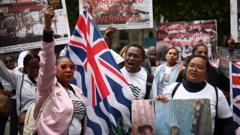**The agreement initially grants Mauritius sovereignty over the Chagos Islands while allowing continued military presence for the US and UK, igniting mixed reactions domestically and internationally.**
**UK Enters £101 Million Annual Agreement for Chagos Islands Transfer and Military Lease**

**UK Enters £101 Million Annual Agreement for Chagos Islands Transfer and Military Lease**
**Sir Keir Starmer solidifies UK national security through historic deal with Mauritius over Chagos Islands.**
The UK government has reached a pivotal agreement to transfer sovereignty of the Chagos Islands to Mauritius, ensuring the continued operation of a significant military base on Diego Garcia. Prime Minister Sir Keir Starmer announced the deal, which costs the UK £101 million annually over the next 99 years, claiming it as essential for the base's long-term viability and the security of the nation.
Under this agreement, Mauritius will gain ownership of the islands, allowing the UK and US to maintain military operations at Diego Garcia for nearly a century. Despite this, the Conservative Party criticized the move as detrimental to national interests, arguing it could expose the UK to increased Chinese influence through Mauritius.
Negotiations resumed after overcoming a last-minute legal challenge posed by two Chagossian women, concerned about their rights and the future of their homeland. The agreement's financial commitment is characterized as a "net cost" of approximately £3.4 billion when adjusted for inflation.
Starmer reassured allies about the strategic importance of Diego Garcia, indicating that failure to reach the agreement could risk the establishment of foreign military bases nearby. Additionally, the treaty includes a protective area around Diego Garcia and bars unauthorized foreign access to other islands in the group.
Mauritian Prime Minister Navin Ramgoolam hailed the agreement as a breakthrough for national sovereignty. Nonetheless, concerns linger within the Chagossian community, whose members express dissatisfaction over their lack of representation in the negotiations.
The legal precedent drawn from the High Court's dismissal of the challenge reflects heightened tensions regarding the Chagossians' say in their homeland's future. While some in Mauritius have celebrated the agreement, dissent among Chagossians persists, with leaders emphasizing their connection to the islands and the risks involved in ceding control to Mauritius.
The Chagos Archipelago's complex history, dating back to its separation from Mauritius during British colonial rule in 1965, casts a long shadow over contemporary negotiations. The UK has faced increasing pressure to resolve the islands' status, including backing from the United Nations for Mauritius' sovereignty claims.
With the treaty still pending approval from both UK and Mauritian parliaments, it marks a significant chapter in the territorial saga that has left the future of the Chagossian community hanging in the balance.
Under this agreement, Mauritius will gain ownership of the islands, allowing the UK and US to maintain military operations at Diego Garcia for nearly a century. Despite this, the Conservative Party criticized the move as detrimental to national interests, arguing it could expose the UK to increased Chinese influence through Mauritius.
Negotiations resumed after overcoming a last-minute legal challenge posed by two Chagossian women, concerned about their rights and the future of their homeland. The agreement's financial commitment is characterized as a "net cost" of approximately £3.4 billion when adjusted for inflation.
Starmer reassured allies about the strategic importance of Diego Garcia, indicating that failure to reach the agreement could risk the establishment of foreign military bases nearby. Additionally, the treaty includes a protective area around Diego Garcia and bars unauthorized foreign access to other islands in the group.
Mauritian Prime Minister Navin Ramgoolam hailed the agreement as a breakthrough for national sovereignty. Nonetheless, concerns linger within the Chagossian community, whose members express dissatisfaction over their lack of representation in the negotiations.
The legal precedent drawn from the High Court's dismissal of the challenge reflects heightened tensions regarding the Chagossians' say in their homeland's future. While some in Mauritius have celebrated the agreement, dissent among Chagossians persists, with leaders emphasizing their connection to the islands and the risks involved in ceding control to Mauritius.
The Chagos Archipelago's complex history, dating back to its separation from Mauritius during British colonial rule in 1965, casts a long shadow over contemporary negotiations. The UK has faced increasing pressure to resolve the islands' status, including backing from the United Nations for Mauritius' sovereignty claims.
With the treaty still pending approval from both UK and Mauritian parliaments, it marks a significant chapter in the territorial saga that has left the future of the Chagossian community hanging in the balance.



















